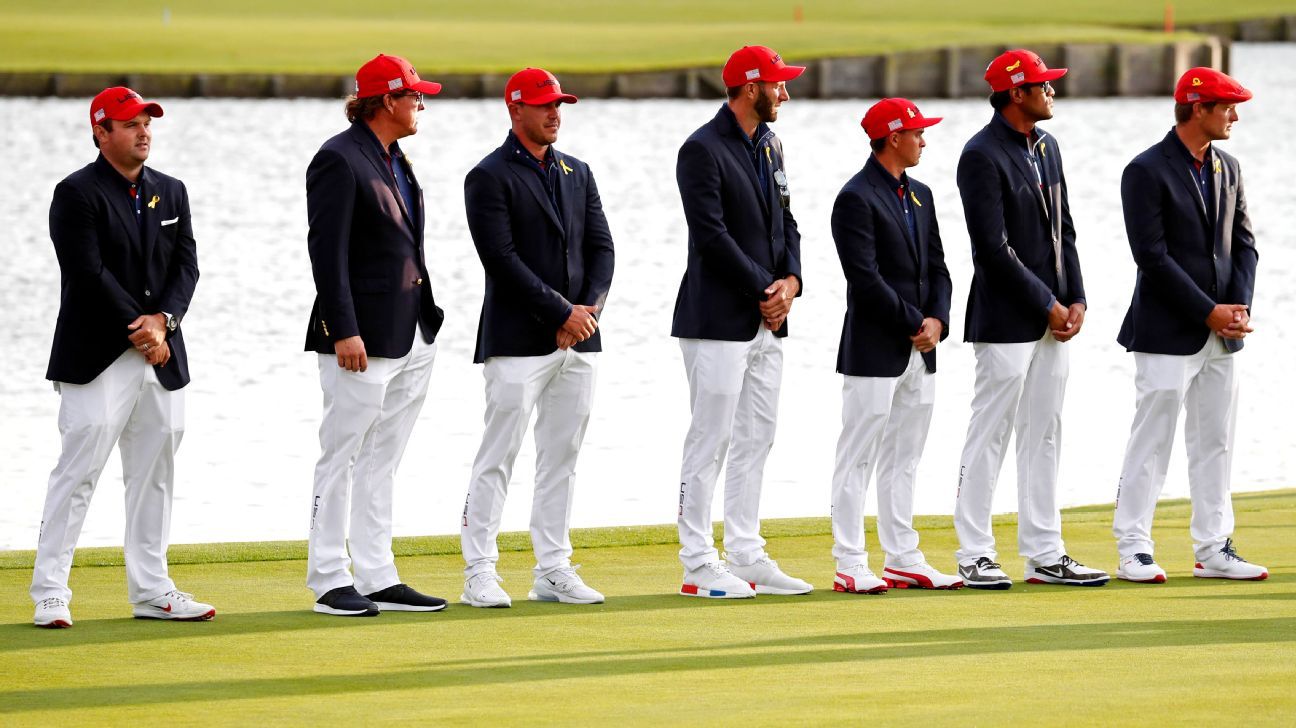In the aftermath of another convincing Ryder Cup victory, the European Tour released a video that was shown to the team on the eve of the competition in Paris, an inspirational, motivating piece that no doubt had players ready to charge to the first tee in darkness.
It is only 2 minutes, 30 seconds, but it embodies what Europe and the Ryder Cup is all about. Featuring, among others, a sobbing Jose Maria Olazabal evoking the memories of Seve Ballesteros, the notion of passion and pride and giving everything to the cause is on full display.
There is no denying its excellence, and how moving it undoubtedly was to the European players who romped to victory.
Then again, it had nothing to do with the Americans’ inability to hit fairways and make putts; the poor form of players such as Phil Mickelson, Tiger Woods and Patrick Reed; Dustin Johnson‘s decision to change his putting method the week before the event; and any perceived or real conflicts within the team room.
The typical narrative has emerged in the wake of the 17½-10½ defeat at Le Golf National: The Americans don’t possess the same pride as the Europeans; they don’t care about the Ryder Cup as much; they don’t play well as a team; the captain has too much (or too little) say. And on it goes.
So a question: Does that mean the Europeans lacked those same qualities for which they are hailed when they went to Hazeltine two years ago and lost? Suddenly that year, they had less pride, didn’t care about the Ryder Cup as much, didn’t play well as a team, and the captain messed up?
The Ryder Cup continues to be an amazing event, but even more so is the angst that comes out of it — for either side. The drama that unfolds during the week is often surpassed by the drama afterward. And there is no shortage of examples.
Patrick Reed is at the center of it this time for the U.S., along with the notion that captain Jim Furyk erred in his pairings.
Two years ago, England’s Danny Willett caught the ire of fans for what was intended to be a tongue-in-cheek blog post about Americans written by his brother, and the Europeans crumbled. Captain Darren Clarke was criticized for picking buddy Lee Westwood (similar to the criticism levied at Furyk for having Mickelson this year).
In 2014, it was Mickelson’s takedown of Tom Watson in the aftermath at Gleneagles. In 2012, Davis Love III didn’t set up the golf course more favorably toward the U.S. side at Medinah and didn’t send out the right singles lineup on Sunday as the U.S. blew a 10-6 lead. In 2010, those U.S. rain suits leaked as it poured throughout the first day! In 2008, Nick Faldo was a bumbling European captain. (Never mind that his best players at the time, Padraig Harrington, Sergio Garcia and Westwood, combined to go 0-7-5.)
It goes on and on. Good thing golf has these team events just once a year.
Or, as Brooks Koepka put it Wednesday at the Dunhill Links in Scotland: “The problem is you guys [the media] try to find a reason why we lost, and the simple reason is we just didn’t play good enough.”
He’s actually correct on both accounts. The U.S. did not play well enough last week. It’s simply fair to wonder why and to see if there is more behind it.
Reed’s comments to The New York Times, in which he blasted the decision to end his successful partnership with Jordan Spieth, are going to be ripe for examination.
Considering they had gone 8-1-3 over the course of the past Presidents Cup and Ryder Cups, the decision was more than a little curious and led to the possibility of other pairings going awry: for example, splitting up a successful team of Rickie Fowler and Justin Thomas, who played with Spieth instead. Reed then played with Woods.
There were other questionable decisions, too. For example, putting Mickelson out in foursomes, despite his poor form, with rookie Bryson DeChambeau. Second-guessing is part of sports when things don’t go well.
The problem is, all of these moves were allegedly vetted. You can’t put this all on Furyk, who was an assistant at Hazeltine as well as at last year’s Presidents Cup. He has bought into the new “consistency and continuity” edict of the current U.S. Ryder Cup mission that included having past captain Davis Love III and presumed future captain Steve Stricker as part of his brain trust.
And, of course, there is the Tiger and Phil influence. They are a big part of the decision-making process.
Six weeks ago, before he was even named one of Furyk’s picks, Mickelson said: “We know exactly what the issue has been. Now that we as a group — Tiger, myself, Furyk and Stricker — we’ve been part of the winning side on the Presidents Cup, we’ve been on the losing side on the Ryder Cup.
“We know exactly what the difference is, and now that we have involvement, we’re going to fix it. It doesn’t mean we’re going to win. It means we’re going to put ourselves in a position to exceed more often than not.”
This time, they didn’t come close. Mickelson and Woods combined to go 0-6. No. 1-ranked Johnson went 1-3. Reed was 1-2. And Spieth failed, again, to win a singles match, now 0-6 over three Presidents Cups and three Ryder Cups.
Not enough passion? Not enough pride?
More likely, not enough fairways and greens.
Or maybe the Americans’ pre-tournament video just wasn’t good enough.
